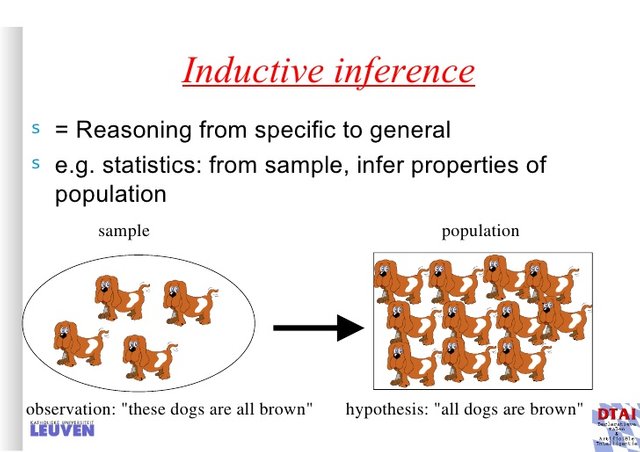Knowing The Problem of Induction Method in Scientific Discovery

Image Source
Empirical sciences can be described by the way that they utilize inductive methods. The logic of scientific discovery would be indistinguishable with inductive logic. It is normal to call an inference inductive in the event that it goes from singular statements, for example, accounts of the aftereffects of perceptions or trials, to universal statements, for example, speculations or hypotheses.
Presently it is a long way from reality that we are advocated in deriving universal statements from singular, regardless of how various for any conclusion drawn along these lines may always turn out to be false, regardless of what number of cases of white swans we may have watched, this does not legitimize the conclusion that all swans are white. The inquiry whether inductive inferences are legitimized is known as the issue of acceptance.
The issue of enlistment may likewise be formulated as the topic of the validity or the truth of universal statements which depend on experience, for example, the speculations and theoretical systems of the empirical sciences. For many people trust that the truth of these universal statements is known by experience, yet unmistakably an account of an experience can in the first place be just a singular statement and not a universal.
People who say of a universal statement that we know its truth for a fact usually imply that the truth of this universal statement can some way or another be diminished to the truth of singular ones, and that these singular ones are known by experience to be true, which amounts to stating that the universal statement depends on inductive inference. Therefore to ask whether there are natural laws known to be true seems, by all accounts, to be just another way of asking whether inductive inferences are logically defended.

Image Source
However in the event that we need to discover a way of advocating inductive inferences, we should first of all attempt to set up a principle of enlistment. A principle of enlistment would be a statement with the assistance of which we could put inductive inferences into a logically adequate form. According to the upholders of inductive logic, a principle of enlistment is of incomparable significance for scientific method decides the truth of scientific hypotheses.
To dispose of it from science would amount to nothing not exactly to deny science of the ability to choose the truth or falsity of its speculations. Without it, science would never again have the privilege to recognize its speculations from the whimsical and subjective manifestations of the poet's mind.
Presently this principle of enlistment can't be a simply logical truth like a tautology statement. In reality, if there were such an unbelievable marvel as an absolutely logical principle of acceptance, there would be no issue of enlistment, for this situation, all inductive inferences would need to be viewed as simply logical or tautological transformations, much the same as inferences in deductive logic. Consequently the principle of enlistment must be a synthetic statement, a statement whose invalidation is not self-conflicting but rather logically conceivable.
So the inquiry emerges why such a principle ought to be acknowledged at all, and how we can legitimize its acknowledgment on sane grounds. Some who put stock in inductive logic are on edge to bring up, with Reichenbach, that the principle of enlistment is wholeheartedly acknowledged by the entire of science and that no man can genuinely question this principle in regular daily existence either. The principle of acceptance is unnecessary, and that it must prompt logical inconsistencies.

Image Source
That inconsistencies may effortlessly emerge regarding the principle of enlistment ought to have been clear by Hume, that they can be stayed away from, if at all, lone with trouble. For the principle of enlistment must be a universal statement in its turn. Subsequently on the off chance that we endeavor to view its truth as known as a matter of fact, at that point the extremely same issues which occasioned its presentation will emerge all finished once more.
To legitimize it, we ought to need to utilize inductive inferences, and we ought to likewise need to expect an inductive principle of a higher request. In this way the endeavor to construct the principle of acceptance with respect to experience separates, since it must prompt an endless relapse. Kant endeavored to drive his way out of this trouble by taking the principle of acceptance to be apriori valid. In any case, we don't believe that his bright endeavor to give an apriori support to synthetic statements was fruitful.
View is that the different troubles of inductive logic here outlined are difficult. So additionally are those intrinsic in the precept, so generally current today, that inductive inference can achieve some degree of dependability. As per this principle, inductive inferences are probable inferences. To be more correct, we should state that it serves to choose probability. For it is not given to science to reach either truth or falsity yet scientific statements can just accomplish ceaseless degrees of probability whose unattainable upper and lower limits are truth and falsity.
At this stage we can neglect the way that the believers in inductive logic engage a thought of probability that we shall later reject as profoundly unacceptable for their own particular purposes, in light of the fact that the challenges mentioned are not in any case touched by an interest to probability. For if a specific degree of probability is to be doled out to statements in light of inductive inference, at that point this should be legitimized by conjuring another principle of enlistment, suitably altered.
This new principle in its turn should be advocated. Nothing is picked up if the principle of acceptance is taken not as true but rather just as probable. Like each other form of inductive logic, the logic of probable inference, or probability logic, drives either to an endless relapse, or to the tenet of apriorism.

Image Source
Never knew this much about it... Thanks for sharing with us.
Downvoting a post can decrease pending rewards and make it less visible. Common reasons:
Submit